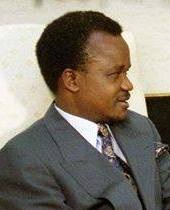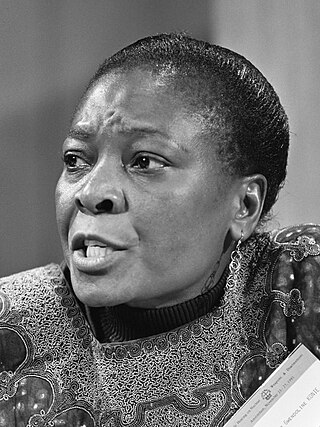Related Research Articles

Kenneth Kaunda, also known as KK, was a Zambian politician who served as the first president of Zambia from 1964 to 1991. He was at the forefront of the struggle for independence from British rule. Dissatisfied with Harry Nkumbula's leadership of the Northern Rhodesian African National Congress, he broke away and founded the Zambian African National Congress, later becoming the head of the socialist United National Independence Party (UNIP).
The history of Zambia experienced many stages from colonization to independence from Britain on October 24, 1964. Northern Rhodesia became a British sphere of influence in the present-day region of Zambia in 1888, and was officially proclaimed a British protectorate in 1924. After many years of suggested mergers, Southern Rhodesia, Northern Rhodesia, and Nyasaland were merged into the British Federation of Rhodesia and Nyasaland.

The politics of Zambia takes place in a framework of a presidential representative democratic republic, whereby the president of Zambia is head of state, head of government and leader of a multi-party system. Executive power is exercised by the government, while legislative power is vested in both the government and parliament. Formerly Northern Rhodesia, Zambia became a republic immediately upon attaining independence in October 1964.

After independence in 1964 the foreign relations of Zambia were mostly focused on supporting liberation movements in other countries in Southern Africa, such as the African National Congress and SWAPO. During the Cold War Zambia was a member of the Non-Aligned Movement.

Frederick Jacob Titus Chiluba was a Zambian politician who was the second president of Zambia from 1991 to 2002. Chiluba, a trade union leader, won the country's multi-party presidential election in 1991 as the candidate of the Movement for Multi-party Democracy (MMD), defeating long-time President Kenneth Kaunda. He was re-elected in 1996. As he was unable to run for a third term in 2001, former Vice President Levy Mwanawasa instead ran as the MMD candidate and succeeded him. After leaving office, Chiluba was the subject of a long investigation and trial regarding alleged corruption; he was eventually acquitted in 2009.

The president of Zambia is the head of state and the head of government of Zambia. The office was first held by Kenneth Kaunda following independence in 1964. Since 1991, when Kaunda left the presidency, the office has been held by seven others: Dr. Frederick Chiluba, Levy Mwanawasa, Rupiah Banda, Michael Sata, Edgar Lungu and the current president Hakainde Hichilema, who won the 2021 presidential election. In addition, acting president Guy Scott served in an interim capacity after the death of President Michael Sata.

The prime minister of Zambia was the head of government of Zambia. From 1973 to 1975, Mainza Chona was the first person to hold the position following independence from the United Kingdom.

Elections in Zambia take place within the framework of a multi-party democracy and a presidential system. The President and National Assembly are simultaneously elected for five-year terms.
Mainza Mathias Chona was a Zambian politician and founder of UNIP who served as the third vice-president of Zambia from 1970 to 1973 and Prime Minister on two occasions: from 25 August 1973 to 27 May 1975 and from 20 July 1977 to 15 June 1978.
Elijah Haatuakali Kaiba Mudenda was a Zambian politician. He served as the 2nd Prime Minister of Zambia from 27 May 1975 to 20 July 1977.

Michael Charles Chilufya Sata was a Zambian politician who was the fifth president of Zambia, from 23 September 2011 until his death on 28 October 2014. A social democrat, he led the Patriotic Front (PF), a major political party in Zambia. Under President Frederick Chiluba, Sata was a minister during the 1990s as part of the Movement for Multiparty Democracy (MMD) government. He went into opposition in 2001, forming the PF. As an opposition leader, Sata – popularly known as "King Cobra" – emerged as the leading opposition presidential contender and rival to President Levy Mwanawasa in the 2006 presidential election, but was defeated. Following Mwanawasa's death, Sata ran again and lost to President Rupiah Banda in 2008.
Christianity has been very much at the heart of religion in Zambia since the European colonial explorations into the interior of Africa in the mid 19th century. The area features heavily in the accounts of David Livingstone's journeys in Central Africa.

Kristen Rogheh Ghodsee is an American ethnographer and Professor of Russian and East European Studies at the University of Pennsylvania. She is primarily known for her ethnographic work on post-Communist Bulgaria as well as being a contributor to the field of postsocialist gender studies.
Vernon Johnson Mwaanga is a Zambian diplomat and politician.
Jethro Mukenge Mutti, was a Zambian politician who between the years 1964 to 1975 served as member of parliament, Ambassador, Minister and Member of the Central Committee under the ruling party UNIP led by Kenneth Kaunda. He died on 18 January 2013 after complications from aspiration pneumonia following a series of mini strokes and poor health in the last few years of his life, linked to his tetraplegic condition.

Gwendoline Noreen Chomba Konie was a Zambian poet, diplomat and politician. She was the Zambian ambassador to Scandinavia, the United Nations and Germany. She formed her own party in 2000 and stood as a candidate to be the President of Zambia in 2001. When she died she was given a state funeral.
Daniel Munkombwe was a Zambian politician. He worked as a political organizer and administrator for the ZANC in Northern Rhodesia before and after independence. He was elected to Parliament in 1973 and served for 19 years. In 2001, he was appointed Minister for the Southern Province by Levy Mwanawasa and continued in that and other government posts until 2015, having been subsequently appointed by Rupiah Banda and Michael Sata.
Monica Nanyangwe Chintu was a Zambian politician, one of Zambia's first female politicians.
The Committee of the Bulgarian Women’s Movement (CBWM) (1968-1990) was a government-affiliated organization in Bulgaria that aimed to improve women's participation in the labor force, decrease the declining birth rate, and promote gender equality during the Bulgarian socialist era. It accomplished these goals by advocating for women's rights, redefining gender roles, and securing state support for women's issues. Notable accomplishments include maternity leave and abortion rights and a program of social engineering to encourage men to take a more active role in child-rearing and homemaking activities. The CBWM played a prominent role in securing development aid for struggling economies in Africa and trained female leaders in Bulgaria to help feminist activists from Zambia. The committee has been recently recognized by scholars for its acute impacts of women’s rights at the international level, with many progressive policies emerging directly from the committee’s initiatives and influences. The CBWM was dissolved in 1990 after the fall of communism in Bulgaria.

Embassy Park Presidential Burial Site, commonly referred to as Embassy Park or Embassy Memorial Park, is a national monument in Lusaka,Zambia. It serves as the official burial place for the country's presidents and is a site of immense historical and cultural significance. Designated as a National Monument in 2009, Embassy Park is also known to be a symbol of Zambia's political and social heritage. The site honours the contributions of the country's leaders towards its growth and development. Among those buried here are Kenneth Kaunda, the first president of Zambia, Frederick Chiluba, the second president, Levy Mwanawasa, the third president, Rupiah Banda, the fourth president, and Michael Sata, the fifth president. The park is accessible to the public and also provides a platform for visitors to pay their respects to Zambia's former presidents and to learn more about the country's cultural and political background. Its status as a national monument underscores its significance in safeguarding and promoting Zambia's rich history.
References
- ↑ Ghodsee, Kristen (2019-01-31). Second World, Second Sex: Socialist Women's Activism and Global Solidarity during the Cold War. Duke University Press. ISBN 978-1-4780-0327-4.
- 1 2 3 Ghodsee, Kristen (2015-06-10). "Internationalisme socialiste et féminisme d'État pendant la Guerre froide. Les relations entre Bulgarie et Zambie". Clio. Femmes, Genre, Histoire (in French) (41): 114–137. doi: 10.4000/clio.12374 . ISSN 1252-7017.
- ↑ Ghodsee, Kristen R. (2021-07-01). "Les « grands-mères rouges » du mouvement international des femmes". Le Monde diplomatique (in French). Retrieved 2023-10-29.
- 1 2 AN INSIGHT INTO THE EVOLUTION OF THE ZAMBIAN PARLIAMENT
- ↑ Lunz, Kristina (2023-09-05). The Future of Foreign Policy Is Feminist. John Wiley & Sons. ISBN 978-1-5095-5784-4.
- ↑ Programme (Zambia), United Nations Development (2001). 36 Years of UNDP's Partnership with the Government of Zambia, 1964-2000. UNDP.
- ↑ Remise de lettres de créance , retrieved 2023-10-29
- ↑ "Zambie: un vent de privatisations". Les Echos (in French). 1992-07-31. Retrieved 2023-10-29.
- ↑ "Ambassador Lily Mubitana Monze's Rain Child book launch Anglican Cathedral of the Holy Cross Monday 4 December 2017 Archives". Rainbow news zambia. Retrieved 2023-10-29.